May 2, 2024 | 08:21 GMT +7
May 2, 2024 | 08:21 GMT +7
Hotline: 0913.378.918
May 2, 2024 | 08:21 GMT +7
Hotline: 0913.378.918
On the exhausted sandy land of Ly Trach commune (Bo Trach district, Quang Binh province), over 1.2 ha of Taiwan custard apples from Mr. Nguyen Ngoc Cuong still have green leaves and fruit-laden branches. Mr. Cuong, who boldly applied the new "nature-based" farming method to custard apple trees, said: "Nature-based farming is a new direction that limits the impact on the soil while creating an environment for biological systems to develop naturally, acting as partners in restoring nutrients for the soil by organic methods."
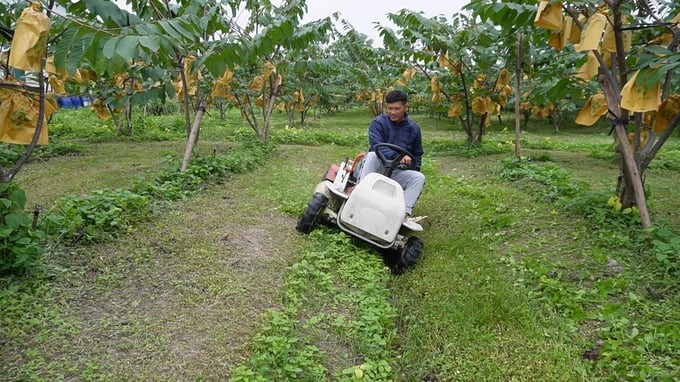
Mr. Cuong does not clean the grass but uses the lawn mower to cut vegetation in the garden. Photo: T. Phung.
The hilly land in Ly Trach commune is inherently infertile because it has exhausted sandy soil. To help crops grow well and improve the soil, Mr. Cuong read newspapers, watched television, and focused on farming solutions in the direction of enriching the soil.
"Organic farming is the method I chose first because, with this farming method, soil nutrients will gradually increase year by year, and crops will develop more sustainably," said Mr. Cuong.
On his family's land, Mr. Cuong chose organic fertilizer to spread on the surface layer and rake it evenly. In the following years, he did not rake but spread it evenly and let the garden grass grow seasonally. In addition, he also bought composted manure to fertilize crops under the root.
Mr. Cuong said that in addition to organic farming, crops are fertilized with organic fertilizers, and microbial products containing fungi resistant to pests and diseases are selected to prevent pests and diseases for custard apple trees. He left the garden soil natural without "disturbing" the soil, just fertilized the plants, and then used the scissor or lawn mower to cut the grass.
“This means that we have little impact on the soil, such as plowing, cultivating the root, etc., but consider garden soil as forest soil so that microorganisms can grow seasonally and adapt to different types of grass. The grass is not pulled out or cleaned, but only cut close to the root by a lawn mower," Mr. Cuong shared.
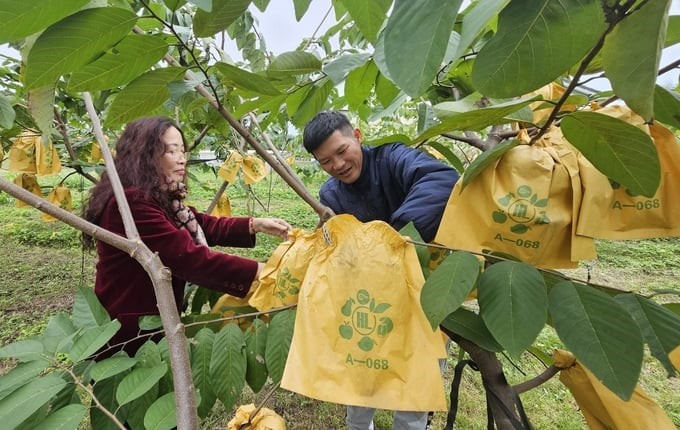
The bags used to cover Taiwan custard apples are also of organic origin and biodegradable. Photo: T. Phung.
According to Mr. Cuong, after being cut, the grass will return organic matter to the soil. Worms in the soil will help the soil surface retain moisture and nutrients to provide for the plants. "After 3 years, this farming method has resulted in more fertile soil, longer-lasting green crops, and higher productivity," he said.
On the exhausted sandy land, the garden of Mr. Cuong’s family has a different soil color, fresher and darker. Almost the entire soil surface of the garden was covered with a thick layer of worm poop. Mr. Cuong uses a hard bamboo stick to crash into the ground and then turns it up to show that the humus layer full of worm poop is very loose and rich in nutrients.
"When it comes to farming and enriching the soil, we were initially successful because this land is no longer as exhausted as before; instead, it has a lush green ecosystem with fruit trees and thick vegetation," said Mr. Cuong.
Mr. Cuong said that previously, the garden mainly grew queen guava and seedless guava. However, the guava varieties planted at that time were not very suitable for the soil here, so they often suffered from mycorrhiza, quick aging, and pests. The garden also tried destroying guava trees with quick aging to replant with a new guava variety (pear guava), but because the soil was heavily infected with fungus, the guava could not grow. After that, the garden continued to test many new fruit tree varieties and found that Taiwan custard apple trees were the most suitable for the soil here, so he decided to invest in this type of crop.
With his passion for farming, Mr. Cuong has researched and gained experience and knowledge through mass media and social networks. Thanks to that, he was able to grasp the technical process of caring for and handling Taiwan custard apples in accordance with local weather and soil conditions. In 2020, he boldly started implementing the custard apple growing model. After a period of successful trial planting, in 2023, Mr. Cuong decided to expand the area.
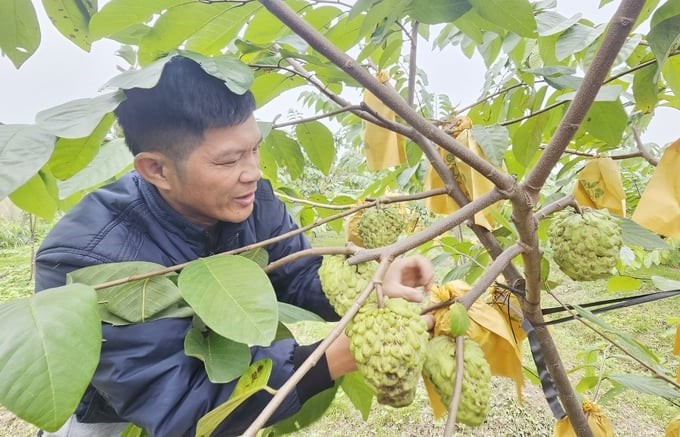
The first Taiwan custard apple harvest crop brought Mr. Cuong a profit of about VND 200 million/ha. Photo: T. Phung.
According to Mr. Cuong, the Taiwan custard apple is easy to grow but requires a proper care process for the plant to be effective. During the bud stage, the plant is very susceptible to diseases and insect attacks, so every step must be strictly followed. "For custard apples, it is necessary to pollinate each fruit one by one, and the pollination time is from about 7 to 11 p.m. When the fruit is 2 months old, before wrapping the fruit, it is mandatory to use a spray bottle and a small brush to clean each fruit one by one to ensure that no fungus or moss remains on the surface of the fruit's shell," Mr. Cuong said.
Once production was stabilized, Mr. Cuong established Tam An High-Tech Agricultural Cooperative (Tam An Cooperative) with mainly seasonal fruit trees such as custard apple, watermelon, honeydew melon, guava, etc. "With cooperatives, there will be many enthusiastic people contributing capital and land to jointly build a brand and develop fruit gardens on this exhausted sandy land," said Mr. Cuong.
In order for customers to know about the custard apple garden, Tan An Cooperative has a program to open the farm for everyone to visit, experience for free, and buy custard apples at the garden. Tam An Cooperative is also willing to share its experience and techniques for growing Taiwan custard apples with those who need them.
Ms. Le Thi Minh Thai (Bac Ly ward, Dong Hoi city), a visitor to Tam An Cooperative's custard apple garden, said that her family has ordered Taiwan custard apples grown by Tam An Cooperative many times. "In my opinion, the custard apple grown here has a much sweeter and more fragrant taste than the Taiwan custard apple imported from other places. Wishing to explore the garden, today my friends and I came here. It was very interesting to see the custard apples on the tree, take pictures, and buy fruits to take home from the garden," she said.
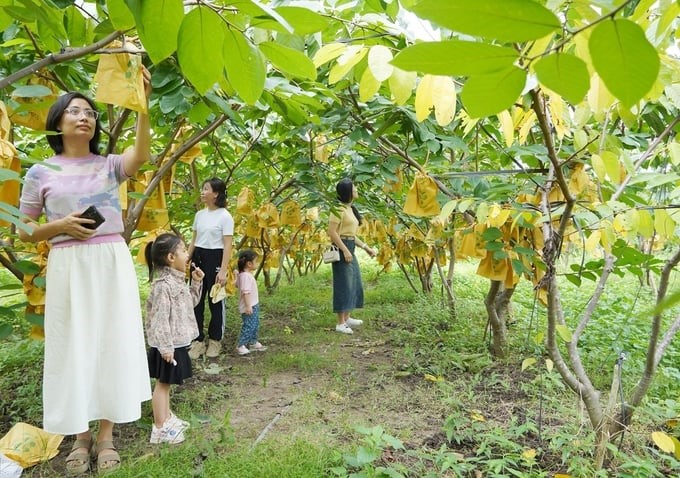
People come to visit the Taiwan custard apple garden of Tam An Cooperative. Photo: T. Phung.
According to Mr. Nguyen Ngoc Cuong, Taiwan custard apple has a harvest crop from November to January of the following lunar year; the remaining time is to take care of the trees. When harvested, Tam An Cooperative's custard apples weigh an average of 0.4–0.8 kg/fruit, depending on the time. Currently, the Taiwan custard apple consumption market of Tam An Cooperative includes customers and clean agricultural product stores inside and outside the province. According to calculations, with an area of 1.2 ha of custard apple, the first harvest crop yields about 3 tons of fruit. With a selling price of VND 80,000–130,000/kg (depending on size), after deducting costs, Mr. Cuong gains a profit of about VND 200 million.
“In the coming time, when the custard apple output is greater, Tam An Cooperative will plan and expand the production area, aiming for being certified to meet Vietnamese organic standards and building OCOP products from custard apple," Mr. Cuong added.
Commenting on this model of organic agriculture in a "nature-based" direction, Mr. Nguyen Cam Long, Head of the Bo Trach Department of Agriculture and Rural Development, said that this is the first model of growing the Taiwan custard apple variety in Bo Trach district, bringing high efficiency and prospects. It is shown that the Taiwan custard apple tree is suitable for the local soil and climate, especially in the Ly Trach land. The district expects that after evaluating the Taiwan custard apple model at Tam An Cooperative, the unit will have a policy to expand the area and build a custard apple production area.
“We recognize the new farming method that enriches the soil in this model. The district will also guide and orient Tam An Cooperative to build Taiwan custard apple products following the direction of VietGAP, organic, and OCOP products. On that basis, the district will direct the replication of the model in the coming time," said Mr. Nguyen Cam Long, Head of the Bo Trach Department of Agriculture and Rural Development.
Translated by Thu Huyen
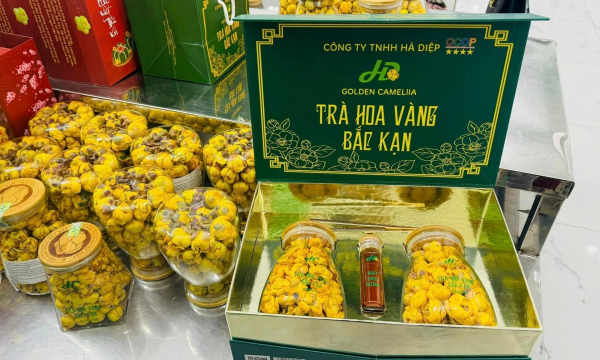
(VAN) In 2024, Bac Kan province has acquired investments for 10 projects in the agriculture and forestry sectors, with a particular focus on the production and processing of medicinal plants.
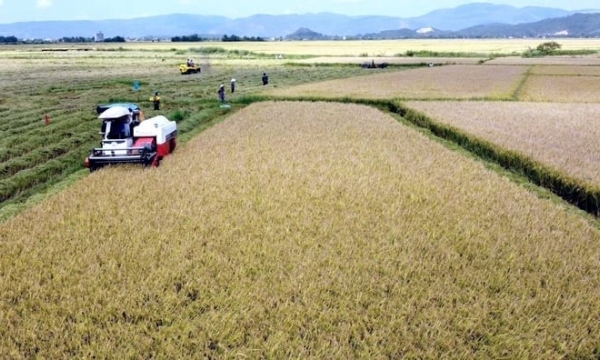
(VAN) Phu Yen is one of the localities with the conditions to develop high-tech agriculture, seafood processing and aquaculture.
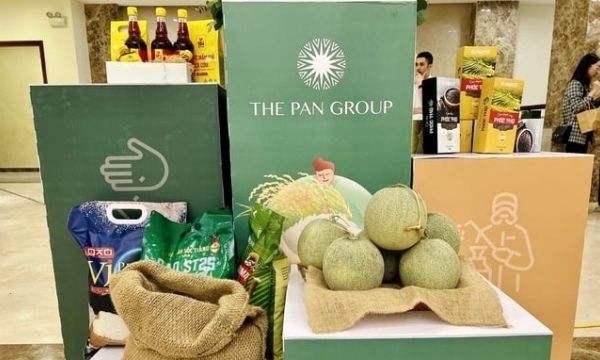
(VAN) In response to climate change concerns and economic challenges, PAN Group sets target of 12% revenue growth with natural agriculture solutions.
/2024/04/26/4910-3-173953_784.jpg)
(VAN) The Nestlé Net Zero Roadmap launched in 2020 has helped the Group transform its business operations and implement measures to reduce greenhouse gas emissions in all fields.
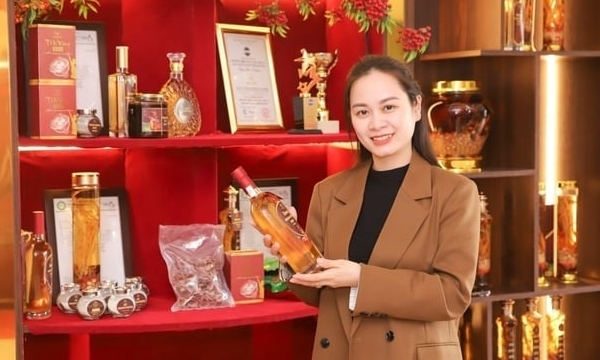
(VAN) Deer antler velvet is known as one of the 'Four Great Traditional Medicines'; however, the value-added aspect from the deep processing of deer velvet is currently overlooked.

(VAN) The three main factors causing the lack of sustainability in the growth of e-commerce in Vietnam are digital divide, digital workforce, and environment

(VAN) South Korean enterprises have increased their investment capital in the city of Hai Phong by nearly VND 400 million following a series of meetings.